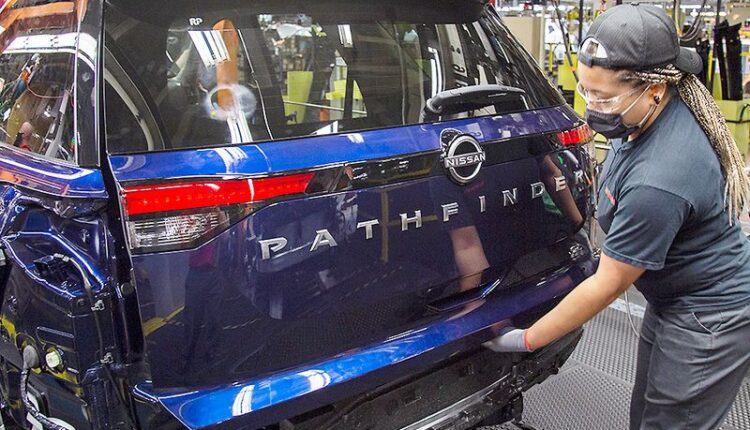The global semiconductor chip shortage could create a steamy summer for the auto industry.
As automakers cope with the supply chain crisis, production interruptions may overlap with normal summer factory shutdowns and model changes.
AutoForecast Solutions estimates that the North American industry could lose more than 340,000 scheduled vehicles over the next two months.
The summer’s scheduled shutdowns will mean a lost opportunity to make up for missed production to date, Sam Fiorani told Automotive News.
“Plant closures in July and beyond virtually eliminate the ability for manufacturers to make up any of the lost volumes this year,” Fiorani said.
But in a play to conserve its supply of microchips for key launches, Nissan Motor Co. is extending its previously scheduled two-week U.S. summer shutdown, halting some production at its Canton, Miss., and Smyrna, Tenn., assembly plants next month.
“As we move into summer, it’ll get tougher and tougher, and then we come out of it,” Nissan brand’s U.S. sales and marketing boss Michael Colleran told Automotive News earlier.
Nissan will idle output of three models — the Murano crossover, Leaf electric hatchback and Maxima large sedan — at its plant in Smyrna, Tenn., for four extra weeks following the plant’s summer shutdown, which begins in late June, according to sources at two suppliers familiar with the matter.
Nissan declined to comment on production schedules at its Smyrna, Tenn., plant but said last week that output of the midsize Altima sedan in Canton, Miss., will be suspended for two weeks following the summer shutdown.
The chip shortage is complicating a product overhaul central to Nissan’s efforts to revive consumer interest and profitability in the United States.
The U.S. plants are preparing to introduce three key redesigned models: the Nissan Pathfinder and Infiniti QX60 crossovers and the Nissan Frontier midsize pickup.
Nissan is prioritizing new launches and high-volume models such as the Sentra, Rogue and Kicks for the limited supply of microchips.
“It’s a bit of a Rubik’s Cube,” Colleran said, referring to allocation decisions. “It’s required us to be on our toes on a day-to-day basis and work every day to understand what the supply chain looks like, what our suppliers can provide us.”
Nissan is not alone in grappling with the complex chip supply issue that was triggered by pandemic-related lockdowns of semiconductor factories last year and exacerbated by an unexpected surge in consumer demand this year.
LMC Automotive forecasts about 1 million vehicles of North American production have been lost because of the chip shortage in the first half of the year, with less than 200,000 expected to be made up by year end.
“This is likely to be a bumpy ride for the industry to weather through 2021 with inventory not expected to consistently reach ‘normal’ levels until 2023,” said Jeff Schuster, LMC’s president of global forecasting.
The chip shortage has had a more muted effect on North American production of the Asian and European transplants.
“The European brands have had fewer exports leave from North America given the weaker recovery in Europe,” Schuster said. “So that has helped keep additional needed volume in the U.S. to support strong demand.”


